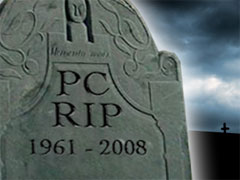You can trust VideoGamer. Our team of gaming experts spend hours testing and reviewing the latest games, to ensure you're reading the most comprehensive guide possible. Rest assured, all imagery and advice is unique and original. Check out how we test and review games here
PC gaming is dead. That’s the feeling amongst hardcore gamers at the moment. It’s easy to see why when you look at the latest sales figures for high profile PC titles. Few PC games released this year can match the level of hype and anticipation generation by Crytek’s Crysis and Epic’s Unreal Tournament 3, but when they sell less than a tenth of the units achieved by high profile console titles, such as Call of Duty 4 and Assassin’s Creed, even the biggest PC gaming defenders must be worried.
During November Crysis, released November 13, shifted 86,633 copies across America. Released a week later UT3 managed to sell an even less impressive 33,995 copies. These might sound like decent numbers, but we’re not talking about small budget titles here. Crysis is as well produced as any console game released this year and its budget must surely be up there with the big boys. These sales will no doubt force EA’s hand in bringing the game to consoles. Epic’s game must also have cost a small fortune, due to an extended development cycle and a substantial ad campaign.
Had Crysis been released on a console this Christmas, say the Xbox 360, sales would have been high, no question. I’m no analyst but for a game as technically brilliant as Crysis, on a console where gamers lap up all new games, particularly first-person shooters, I’d have been amazed had the game not sold in excess of 500,000 units through November. Similarly for UT3, I’m sure the PlayStation 3 game will sell more copies than the PC counterpart, and next year’s Xbox 360 version could sell more still.
So why aren’t people buying these PC games? Crysis has been reviewed excellently across the board, averaging 90% on GameRankings, while UT3 isn’t too shabby at 84%. So, the quality of them can’t be a factor. Crysis is up there with the best shooters the PC has ever seen and UT3 offers one of the best multiplayer experiences you can get. The FPS is always used by hardcore PC gamers as ammunition in the mouse and keyboard versus controller argument too, so the genre’s popularity surely isn’t in doubt either.
In my mind, the required spec to run modern PC games plays a part. In the office we’ve got a top of the range Quad Core, SLI, DX10 ready gaming monster, yet Crysis still refuses to run at an acceptable level, especially if we want the game to render at the displays native resolution. Crysis is a game that simply won’t run well on the majority of PCs out there, including the majority of PCs owned by gamers. UT3 falls into the same category, although the requirements are significantly less.
It’s impossible to know for sure what spec machines PC gamers are using, but Valve Software survey people using its Steam service, and the results make for interesting reading. First up is system RAM (or memory). From 729920 unique samples (different systems) taken between today and November 13 (just over one month ago), the stats show that more than 60% of systems include less than 2GB of RAM – a figure that is becoming more or less essential for cutting edge PC games.
Processing speed stats are quite similar, with approximately 60% of systems running a CPU clocked lower than 2.3 Ghz. The real killer as far as gaming goes, though, is the video card, and it’s here that Valve’s stats are most telling. Based on our own judgement of which video cards will run modern PC games acceptably, only 25% of systems in the survey fall into that category. So 75% of systems don’t cut it when running the likes of Crysis. With many modern PC titles claiming to have DirectX 10 GPU support under Windows Vista, the fact that only 7.7% of systems can support it is also quite interesting. Is it any wonder then that these GPU melting blockbusters aren’t selling well?
The age old argument put forward by PC gamers is that it doesn’t matter that PCs cost so much to build because the games are cheaper, so you make the money back. Maybe that’s true, but it doesn’t look like enough games are being bought. Could this be because there’s an even better way to make your money back? Do PC gamers pay anything for their games?
Piracy has been a problem in the video game industry for as long as I can remember. Dodgy C64 cassettes were all over the local market when I was a kid, and while today things aren’t quite as obvious, the internet has allowed almost anyone to access the latest releases without too much bother – all for the price of your internet connection. If the terms Torrent, P2P and Newsgroup don’t mean anything to you, you must be living a very sheltered existence.
I won’t detail how to obtain these illegal versions of software, but it took only three words entered in Google to find a top result offering a full version of Crysis, for free. When the goods are dangled in front of your face it’s easy to see why people fail to resist the temptation and enter the dark side. We’ve seen numerous attempts to counter piracy over the years, but it never seems to go away.
Consoles fair much better here. There are always people that will go to great lengths in order to avoid paying for console games, but unless you want to physically modify your expensive console or run the risk of being banned from using your online account, it’s simply not worth the hassle for most people. Is it at all surprising that World of Warcraft is seen as a saviour of PC gaming? There’s no way to get around the game’s monthly fee, which goes straight into Blizzard’s pocket.
Steam, too, offers some form of shining light for PC gaming, as do the other digital download services offered to PC gamers. Being able to access the latest titles straight away (without needing to nip out to the shop or wait for a delivery) is surely half the battle, and Valve seems to be making good money from its industry leading service. How many people use it to obtain the latest titles and not just to play addictive oddity Peggle is uncertain though.
What’s clear is that PC gaming is in trouble. Even traditionally PC-only genres such as the RTS have made it to consoles, albeit with reduced functionality. It’s a worrying sign though, when developers are looking towards new platforms to sell PC games. If the hardcore PC gaming contingent want their beloved games to remain tailored exclusively for their platform they need to get their wallet out and buy some games. The adventure genre died, first-person shooters have upped and moved to consoles, RTS is migrating and the MMO is looking to experiment on consoles. How long before the PC becomes nothing more than a web-browsing word processor?
World of Warcraft
- Platform(s): macOS, PC
- Genre(s): Fantasy, Massively Multiplayer, Massively Multiplayer Online, RPG

/https://oimg.videogamer.com/images/96cd/unreal_tournament_2007_35.jpg)
/https://oimg.videogamer.com/images/336c/wow_31.jpg)






